高三英语一轮复习 B2U2 Olympic Games-READING
B2U2英语一轮复习
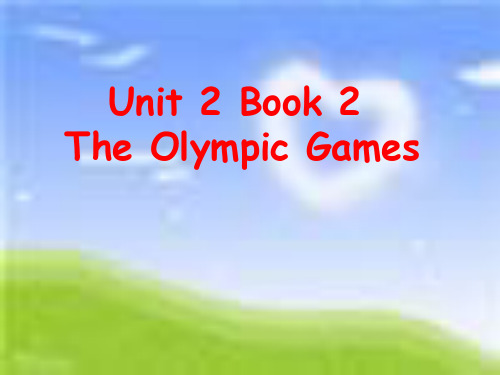
用所给短语的正确形式填空
take part in; work out; be admitted into;as well
as; compete for
1.She and her sister are always competing for attention. 2.He was admitted into Peking University last year. 3.The organization encourages members to meet regularly, as well as provide them with financial support. 4.I believe that you can work out this problem by yourself. 5.How many countries took part in the 29th Olympic Games __ in Beijing?
满希望的
10. deserve vi & vt. 应受(报答或惩罚);值得;
用所给单词的正确形式填空
1 . Because there is so much unemployment,the competition (compete) for jobs is fierce. 2.The magician (magical) performed some astonishing tricks. 3.Take the medicine regularly (regular) three times a day. 4.It‘s myresponsibility (responsible) to lock the doors. 5.The male is physically (physical) stronger than the female. advertisement 6.This (advertise) is calculated to appeal to children. 7.We had a glorious (glory) time at the seaside. 8.With a hopeless (hope) sigh, he turned away. 9.He was angry with himself for having made such a foolish (fool) mistake. painful (pain) to admit that I was wrong. 10.It was
高三英语一轮复习案例M2U2TheOlympicGames
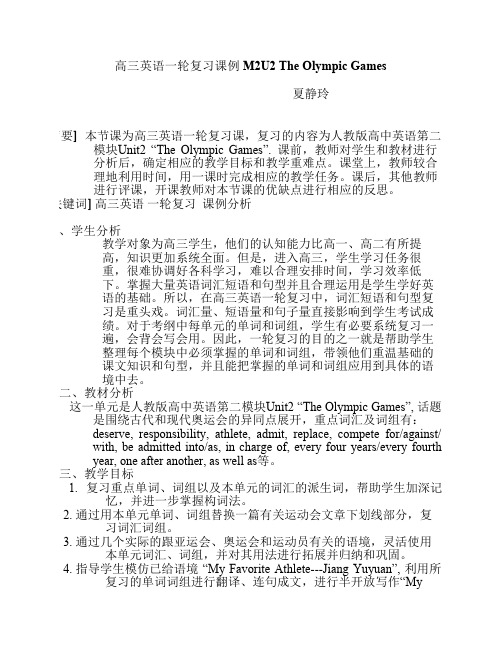
高三英语一轮复习课例 M2U2 The Olympic Games夏静玲[摘要] 本节课为高三英语一轮复习课,复习的内容为人教版高中英语第二模块Unit2 “The Olympic Games”. 课前,教师对学生和教材进行分析后,确定相应的教学目标和教学重难点。
课堂上,教师较合理地利用时间,用一课时完成相应的教学任务。
课后,其他教师进行评课,开课教师对本节课的优缺点进行相应的反思。
[关键词] 高三英语一轮复习课例分析一、学生分析教学对象为高三学生,他们的认知能力比高一、高二有所提高,知识更加系统全面。
但是,进入高三,学生学习任务很重,很难协调好各科学习,难以合理安排时间,学习效率低下。
掌握大量英语词汇短语和句型并且合理运用是学生学好英语的基础。
所以,在高三英语一轮复习中,词汇短语和句型复习是重头戏。
词汇量、短语量和句子量直接影响到学生考试成绩。
对于考纲中每单元的单词和词组,学生有必要系统复习一遍,会背会写会用。
因此,一轮复习的目的之一就是帮助学生整理每个模块中必须掌握的单词和词组,带领他们重温基础的课文知识和句型,并且能把掌握的单词和词组应用到具体的语境中去。
二、教材分析这一单元是人教版高中英语第二模块Unit2 “The Olympic Games”, 话题是围绕古代和现代奥运会的异同点展开,重点词汇及词组有:deserve, responsibility, athlete, admit, replace, compete for/against/with, be admitted into/as, in charge of, every four years/every fourthyear, one after another, as well as等。
三、教学目标1. 复习重点单词、词组以及本单元的词汇的派生词,帮助学生加深记忆,并进一步掌握构词法。
2. 通过用本单元单词、词组替换一篇有关运动会文章下划线部分,复习词汇词组。
高三英语一轮复习Unit2TheOlympicGames练习新人教版必修2

Unit 2 The Olympic Games阅读理解·组块专练——练速度(限时:35分钟)Ⅰ.阅读理解A(2017·东北三省四市教研联合体高考模拟试卷二)The British MuseumWhat's onAlthough many parts of Asia have long been connected through tradealong Silk Road and shared religious systems, there are strong regionaldifferences. In addition to various languages, Asia has developed itscultural networks, patterns of government, technology and styles of artistic representation.The diverse cultural life of Africa has been expressed through everyday cooking objects and unique works of art since ancient times. The Museum's collection of over 200,000 African items includes archaeological and contemporary material from across the continent.The Iron Age was a time of big change for the people of Britain and Europe. Iron replaced bronze as the material used to make tools and weapons, while religion art, daily life, economics and politics changed greatly.Admission and opening timesThe Museum is free and open daily 10:00-17:30 except Friday and is open until 20:30 on Fridays, except Good Friday. The Museum is open every day except for 24, 25 and 26 December and 1 January.Museum shopsBookshopMonday-Thursday 10:00-17:30Friday 10:00-20:00Saturday 10:30-17:30Sunday 10:00-17:30Collection shopMonday-Thursday 09:30-17:30Friday 09:30-20:00Saturday 09:30-17:30Sunday 10:00-17:30Getting hereBy tubeNearest underground stations:Tottenham Court Road (500 m)Holborn (500 m)Russell Square (800 m)Goodge Street (800 m)By busBuses that stop near the Museum: 1,8,19,X25,38,55,98,242By carThe Museum lies within the congestion (拥堵) charge zone. There is little onstreet parking nearby. The nearest car park to the Museum is located at Bloomsbury Square. There is limited parking in the Museum's open space for disabled visitors only.语篇解读:本文是一篇应用文,主要介绍了英国国家博物馆的主要展品、开放时间及交通方式等信息。
人教版高三英语必修2一轮复习Unit2TheOlympicGames单元学案(6页word版)

2020届一轮复习人教版必修2Unit 2 The Olympic Games人教版单元学案学习目标:Developing the skill of writing学习重点:Making paragraphs with some different linking words.学习过程:Ⅰ. Reading (B级)In the modern Olympic Games the longest running race is called the Marathon. It gets its name from a town in Greece called Marathon,which is 26 miles from Athens, the capital city of Greece. This is the story of why the Marathon race is included in the Olympic Games.Once there was an ancient Greek soldier called Phidippides. He ran so fast that he was often sent on long journeys with important messages. One day the leaders of Athens realized that their city was going to be attacked. They sent their army to the small town of Marathon, where they fought their enemie s. It was a very long and hard battle, but at last the army from Athens won. They were very happy. However, they knew that the people of Athens would be wondering what had happened. So they asked Phidppides to go to Athens and tell them the good news.Phi dppides set off. He was very tired after all the fighting but _______________. As he got near Athens he began to slow down. His head was bursting and he could hardly breathe. As he got to the centre ofthe city, he fell to the ground. All the people rushed up to him. Phidippides opened his mouth. “Athens is saved”, he cried. Then he fell down dead. His story became so famo us that it is remembered by the Marathon race of 26 miles, which is the distance from Marathon to Athens.1、What is the best title of the passage? (within10 words)___________________________________________________________ _________________2、Which sentence has the close meaning with the sentence below?But they realized their people couldn’t have known the result of the battle.___________________________________________________________ _________________3、Fill in the blank with proper words or expressions to complete the sentence. (within 10 words)___________________________________________________________ _________________4、How did the race of Marathon get its name? (within 15 words)___________________________________________________________ ____________________________________________________________________________ _________________5、Translate the last sentence of the passage.___________________________________________________________ ____________________________________________________________________________ _________________Ⅱ. Read the short passage . (A级)I first became interested in football when I was nine. Now I play in my school team and join my friends for a game every week on a regular basis. It’s fun.My favourite footballer is David Beckham although I also like Ronaldo. They are both excellent and have great skills too.Apart from playing at school I go to sports school every weekend. I learn many skills there, such as passing the ball and scoring. I especially like playing on the wing like Beckham but being a striker is good as well.Ⅲ. Pay attention to the linking words. (A级)the linking wordsto join different ideas together to add information to strengthendifferencefirst…second; although; apart from; but; though; however; therefore especially; such as; forexample; too; as well;besides; including;according to; s o…that;what’s moreon one hand…on theother hand; while;every coin has twosidesⅣ. Discussion (C级)Atlanta’s favourite sport was running. What’s your favourite sport?﹡how you became interested in that sport﹡your favourite athlete﹡what you do to improve your skillWith these expressions to help you.how you became interested in that sport your favourite athlete what you do toimprove your skillI like …because…I became interested in it when…My favourite athleteis…I like him/herbecause…I practise…In the future I hopeto…Ⅴ.Writing (D级)My favourite sport要求:1. Begin by explaining which sport you like best and why.2. Give reasons for why you like the athlete best.3. What you do to improve your skill.4. Finish by saying what you hope to do with this sport in the future.注意:1. 100词左右。
高考英语一轮复习Unit2TheOlympicGames(讲)(含解析)新人教版必修2
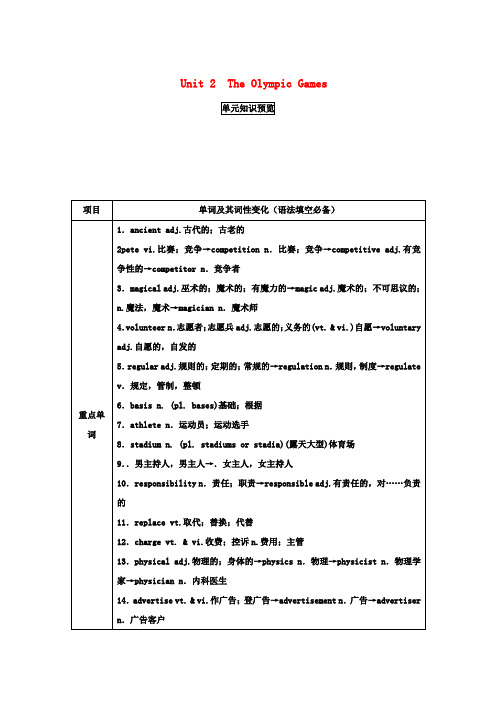
Unit 2 The Olympic Games【重庆市南开中学2016届高三月考】当今,绿色生活方式已被人们广泛接受,并体现在生活的各个方面。
某英语报社现正在中学生中开展以“Green life at life style is becoming increasingly popular nowadays as it can and save energy.【答案】Green life style is becoming increasingly popular nowadays as it can and saveenergy. It is easy to adopt in our daily life and try to reuse it for watering flowers after washing showering or washing. Also,when it is necessary to use the air conditioner,I usually set it to a proper temperature so that I can useless electricity and save money as will. Besides, I always keep in mind that I life day by day.重点单词精讲考点1pete vi. 比赛;竞争【教材原句】How many countries competed in the ancient Olympic Games?(P9)古代奥运会有多少国家参加比赛?【例句研读】(1)Over 1 000 athletes will _______________ the race.将有1 000多名运动员参加赛跑。
(2)The two teams _______________ each other ______ the championship. 这两个队竞争冠军。
高三英语一轮复习 B2U2 Reading
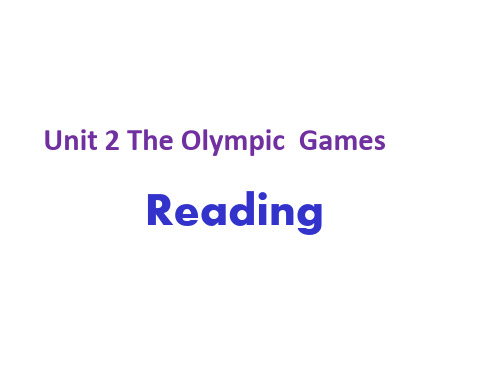
two
skiing running race
slaves 250
gymnasium
medal
Swifter
3. Read the passage carefully and answer the following questions.
1) What amazes Pausanias about the Olympic Games? Pausanias is amazed that many countries take part in the Olympic Games and women too and there are two sets of Games – the Winter and the Summer Olympics.
when they reach the
agreed standard.
5. Every country
E. wants to host the Olympics
because it is a responsibility
and a great honour.
1. Read the passage carefully and tell the statements true or false.
Join the two halves of the sentences together.
1. Pausanias
A. is a volunteer for the
2008 Olympic Games in
Beijing.
2. Li Yan
B. can take part in the
Olympics if their
4. It is very expensive to host the modern Olympic Games. ( T )
人教版高三英语一轮复习必修二Unit2TheOlympicGames单元教案(62页word版)
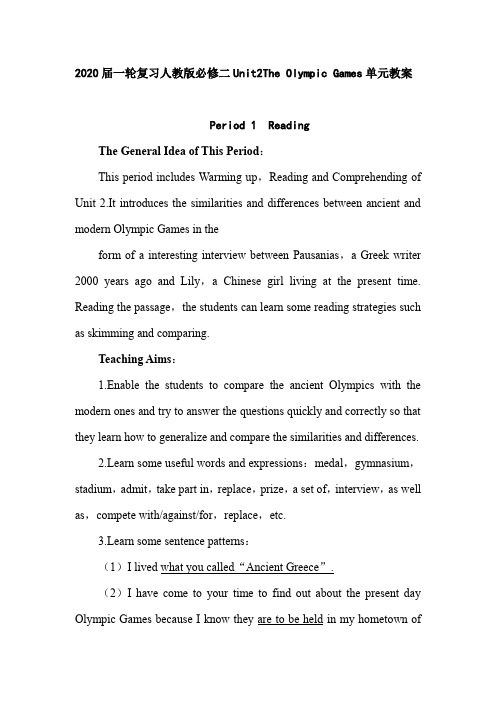
2020届一轮复习人教版必修二Unit2The Olympic Games单元教案Period 1 ReadingThe General Idea of This Period:This period includes Warming up,Reading and Comprehending of Unit 2.It introduces the similarities and differences between ancient and modern Olympic Games in theform of a interesting interview between Pausanias,a Greek writer 2000 years ago and Lily,a Chinese girl living at the present time. Reading the passage,the students can learn some reading strategies such as skimming and comparing.Teaching Aims:1.Enable the students to compare the ancient Olympics with the modern ones and try to answer the questions quickly and correctly so that they learn how to generalize and compare the similarities and differences.2.Learn some useful words and expressions:medal,gymnasium,stadium,admit,take part in,replace,prize,a set of,interview,as well as,compete with/against/for,replace,etc.3.Learn some sentence patterns:(1)I lived what you called“Ancient Greece”.(2)I have come to your time to find out about the present day Olympic Games because I know they are to be held in my hometown ofAthens.Teaching Important Points:1.Help he students to compare the ancient Olympics with the modern ones and have a clear idea of their similarities and differences.2.Learn and master some important words,phrases and sentence patterns in this period.Teaching Difficult Points:1.How to find the implied similarities and differences by understanding the speaker’s words and intonation.2.To master the important language points and sentence patterns in this passage.Teaching Methods:1.Skimming to get the general idea of the text.2.Scanning to get detailed information and get to understand the passage better.3.Task-based methods to get the students to comprehend the passage and be able to produce dialogues and talk about their preparations for the 2008 Olympic Games.Teaching Aids:A tape recorder.A multimedia.Teaching Procedures:Step 1 Lead-in1.Greet the students.T:Good morning/afternoon,boys and girls!Ss:Good morning/afternoon,Miss.2.Introduce the topic of the Olympic Games.(1)Listen to the song Pass the Flame (the theme song of the Athens Olympic Games).T:You look so good today. Would you like to listen to some music?Ss:Of course/Good idea.T:(Play the song)Have you ever heard of the song?Ss:Yes/Sure.T:What is the name of it?Ss:Pass the Flame.T:What else do you know about the song?S1:It’s the theme song sung in the 2004 Athens Olympic Games.S2:科兹拉斯sings it.S3:It calls on people to get united together.(2)Sharing information about the Olympic Games.T:Good. I can see you have a good idea about what is happening around us. Talking about the Olympic Games,I have asked you to find as much information as possible on the history,the motto,the event and the previous Olympic Games,right? Have you done that?Ss:Yes.T:So who would like to share the information with us?S4:Let me have a try. I would like to talk about the events in the Olympic Games.(Introduces the events of badminton,table tennis,hurdles,diving,skiing,skating,volleyball,basketball,volleyball,gymnasium,high jump,weighting lifting and boxing,etc. At the same time,show the information and pictures on the screen.)S5:I want to share some pictures I got on the Internet too.(Also shows what he got on the screen.)Look at the first picture. What is it?Ss:A big stadium.S5:What about this one?Ss:Erh...S5:It’s an Olympic torch. Let’s have a look at this one.What can you see?Ss:A flag.S5:Yes,it is the Olympic flag. There are five rings joined together. Can you guess what the five rings are?(Tells the Ss that they are the five continents. They are joined together as a sign of friendship—the blue one represents the Europe,the yellow one refers to Asia,the black one stands for Africa,the green one is a symbol of Oceania and red one is a sign of America.)T:Thank you! You got so much information with vivid pictures about the Olympic Games. Terrific! Let’s give them a big hand for their hard work!3.Get the students to have a quiz about the Olympic Games.T:Since all of you have either surfed the Internet or read some books to learn about the Olympic Games,what about having a competition and see how well you know about them?Ss:Woo/Good idea/I like competition!T:I would like to divide you into four groups. You can answer my questions for your group. Each time when you get the right answer,you shall get one point for your group. In the end the group that wins shall get some prizes. It is clear?Ss:Yes.(T shows some multiple choices or questions on the screen for the Ss to compete against each other and the Ss shall be rather interested and excited.)1.When did the ancient Olympic Games started?A.1896.B.1906.C.776 BC.2.When did the ancient Olympic Games stop?A.393 BC.B.393 AD.C.311 AD.3.What was rewarded to the winners in ancient Olympic Games?A. Metals.B. Medals.C. Olive wreath.4.How many gold medals did China get in the 2004 Athens Olympics?A.26.B.28.C.30.D.32.5.Which sport is in the Winter Olympic Games?A. Badminton.B. Basketball.C. Speed skating.D. Soccer.6.How many sets/kinds of the Olympic Games are there in the world?7.What is the motto(格言,口号)of the Olympic Games?8.What is the host city of the first Olympics?9.What is the host city of 2000 Olympics?10.What is the host city of 2004 Olympics?11.What is the host city of 2008 Olympics?Suggested answers:1.C2.B3.C4.D5.C6.Two the Winter and Summer Olympic7.Higher,Swifter,stronger8.Athens,Greece9.Sydney,Australia10.Athens,Greece11.Beijing,China4.The events in the Olympics.Just now some of you mentioned some events. Now let’s learn more. Please turn to Page 49 Ex. 1.Read the names of the events and then classify them according to the table.Suggested answers:Sporting events in the winter Olympic Games Sporting events playedbetween teamsSporting events donebest by Chineseathletesice hockey skiing ice skating basketballvolleyballfootballrelay racegymnasticstable tennisbadmintonweight-liftinggymnasticsshooting divingStep 2 PredictingGet Ss to read the title and background information together and predict the main content of the interview.T:Today we are going to learn more about the Olympic Games. Please open the text book and turn to Page 9.What is the title of the passage?Ss:An interview. It is a conversation between two persons.T:Good. Now read the background information together and guess who are the interviewer and interviewee and what they possibly talk about.(Ss read in chorus.)T:Who is the interviewer?S6:Pausanias. He lived in Greece 2000 years ago.T:So did he live in the modern or ancient Olympics?Ss:He lived in ancient Olympics.T:What about the interviewee?S7:The interviewee is Lily,who is a Chinese girl.T:Does she live in the ancient Olympics too?Ss:No,she lives in modern Olympics.T:Very good.(Writes on the blackboard Interviewer Pausanias—ancient Olympics,interviewee Lily—modern Olympics.)Now let’s guess what might they talked about?Ss:It’s probable that they will talk the similarities and differences between the ancient and modern Olympics.T:OK,let’s read and see whether you are right.Step 3 SkimmingGet the Ss to scan the passage and find the answers to the three questions. At the same time,instruct them to find the differences and similarities from the information implied in the intonation,stress,etc.T:Now read the interview and try to find out the answers to the following questions. You will have four minutes.(1)What do they mainly talk about?(2)What does he say when he hears the women are allowed to join in?(3)How does Pausanias feel when he hears that Olympic Games are also about being able to run faster,jump higher and throw further?A. surprisedB. happyC. sad(After four minutes.)T:Now time is up. Who can answer the first question?S8:They mainly talk about the ancient and modern Olympic Games,especially the similarities and the differences.T:Very good. What about the second one?S9:Let me have a try. When Pausanias hears the women are allowed to join in,he says“Please stop! All those events,all those countries andeven women taking part!”We can see he is very surprised.T:Good job. So is this a similarity or a difference?Ss:It is a difference. We can see women couldn’t take part in the ancient Olympic while women can now. And we can see there are more events in the modern Olympics.T:Right. Let’s see the third and last one.S10:Pausanias feels happy when he hears that Olympic Games are also about being able to run faster,jump higher and throw further.T:Well done. So this time is it a similarity or a difference?Ss:It’s about a similarity. The ancient and modern Olympics have the same motto.T:Absolutely right. Now we can see that if we want to analyze the similarities or the differences,we should not read the words but also should pay attention to the tones and intonation of the speakers.Step 4 ScanningDivide the Ss into two groups. One stands for Pausanias and the other stands for Lily. Get them to find out all the information about Olympics of their time.T:Just now we got to know something about Olympics in Pausanias’and Lily’s time. Now I would like to divide you into two groups. One stands for Pausanias and the other stands for Lily. Please find out all the information about the Olympics of your time. Is it clear?Ss:Yes.After they finish getting the answers,check them with the wholeclass. Once the form is finished,all the differences and similarities will be very obvious. Sum up their differences and similarities.Suggested answers:Similarities:1.Both are held every four years.2.Men are allowed to take part both in the ancient and the modern Olympics.3.Some events are the same,such as races,horse riding and running.4.The motto/beliefs are the same. They are swifter,higher and stronger.5.Both are not for money but for honor.Differences:1.There were no winter Olympics in the ancient time.2.Now competitors are from all over the world. But in the ancient time,only people in Greece can take part.3.Only men were allowed to take part in the ancient time,but now women are also allowed.4.In the ancient time,winners got the olive wreath as the prize whole competitors compete for medals.5.The events and athletes are more than those in the ancient time.6.There is a special village for the competitors to live in,a stadium for the competitions and a gymnasium for those who watch the games now. But there were not in the past.Step 5 Dialogue ProductionGet the Ss to make up dialogues according to the following situations.(1)Suppose you are Pausanias. Now you meet your old friend/mother/teacher and you talk with him/her about your interview with Lily.(2)Suppose you are Lily. Now you meet your old friend/mother/teacher and you talk with him/her about what you know from Pausanias.T:So far we have talked a lot about Olympics in Lily and Pausanias’time. Now I would like you to work in pairs and talk about the interview.I would like the Ss in the first two groups to be Pausanias (put some olive wreaths on the head of the students sitting in front of the two groups)and you meet your old friend/mother/teacher and you talk with him/her about your interview with Lily about the modern Olympics. As for the other two groups (facing the two groups),you will be Lily and of course you will talk about your interview with Pausanias about the ancient Olympics with your friend/teacher,ect. You may begin like this:Friend:Hi,Pausanias! I haven’t seen you for days. Where have you been?P:I went to visit a girl in the year 2004...Does it make sense?Ss:Yes.T:Good. Now you have four minutes to prepare your dialogue with your partners.After four minutes,ask two pairs to present their dialogues.Step 6 DiscussionAfter the explanation of the language points,students have got the total understanding of the reading text. Then teacher draws students’attention back to the text and put forward a topic for them to discuss. Divide Ss into groups of four and choose a slip of paper on which their professions are decided. Get the Ss to discuss with their partners about what to prepare for the 2008 Olympic Games as a person with different identification.(For example,what can we do to prepare for the 2008 Olympics as a(n)teacher/university student/a worker in the Gymnasium in Beijing/Guo Jingjing/Tian Liang/Zhang Yimou/the mayor of Beijing/Wen Jiabao...)T:Very good dialogues. You are so clever and creative.As we all know the 2004 Olympics was held in Athens,Greece. What about the 2008 Olympics?Ss:In Beijing,China.T:Yes. And we are all proud of it,aren’t you!Ss:Of course/Sure.T:In fact we can see many advertisements and programmes aboutthe 2008 Olympics. People often say New Beijing New Olympics. Will you do anything to prepare for it?Ss:Yes/Sure/Of course.T:You have the determination to do something for it. But what will you do to prepare for it?S11:I will learn English well.S12:I will try my best to get admission into Beijing University and see the Olympics in 2008.T:It seems that you are ambitious. Now I’d like you to air your view freely. Please work in groups of four,choose a slip of paper on which your jobs are decided and discuss with your group-mates the preparations for the 2008 Olympics. When you are discussing,choose one to record your ideas and after the discussion,choose another one to give a report. Does it make sense?Ss:Yes.(After their discussion,get some students to give their report for their groups.)Step 7 Summary and HomeworkT:Time is running out. Today we learned about the ancient and modern Olympics. Through the comparison between the ancient and modern Olympics,we have learned the differences and the similarities between them. Now we can have a deeper understanding of the Games.From the passage,we can also know that the Olympics are developing and improving. It’s our duty to make the Olympic Games better and healthier. We know that the 2008 Beijing Olympic Games is Green Olympic Games. It shows that people are paying more and more attention to our environment. In the coming Olympic Games what will you do? Of course we should try all our best to get well prepared for it.T:So much for today. Here is the homework for you to do after that your knowledge can be consolidated.Homework:1.Read the passage fluently and recite the key sentences in the text.2.Finish the word exercises on Page 11 and Page 12.3.Write a composition about how to prepare for the 2008 Olympic Games (as a student/teacher/...).Step 8 The Design of the Writing on the BlackboardUnit 2 The Olympic GamesPeriod 1Pausanias(ancient Olympics)Interviewer:Interviewee:Lily(modern Olympics)Similarities and differences between ancient and modern Olympics Language Pointspete vi.=take part incompete with/against sb. for sth. incompetitorcompetition2.take part in join in=take part injoin attend=be present at3.go/start/come/be on a journeyed to dobe/get/become used to doingbe used to do5.be to do6.every+数词+时间名词(pl.)“每……”=every+序数词(single)7.admit sb./sth.+(prep. phrase)(1)allow to enter/let in(2)have enough space for(3)acknowledge8.allowallow sb./sth. allow doing sth. allow sb. to do sth.9.as well as=and,besidesStep 9 Record after TeachingPeriod 2 Learning about LanguageThe General Idea of This Period:This period will consolidate the words and expressions the students learnt in the reading part and deal with the grammar part:the Future Passive Voice. Systematic explanation shall be given and some exercises shall be assigned for the students to complete to consolidate their knowledge on it.Teaching Aims:1.Enable the students to recognize and learn by heart the useful words and expressions learnt in Reading part.(honest,medal gymnasium,stadium,admit,take part in,rep lace,prize,a set of,interview,compete in/against/for,competitor,comp etition)2.Revise the present passive voice and enable the students to use the future Passive Voice to express their idea or plan. Teaching Important Points:1.The Future Passive Voice.2.The basic usage of the Future Passive Voice and learn to use it in different situations.Teaching Difficult Point:How to use the Future Passive Voice.Teaching Methods:Recognize the rules independently and practice.Teaching Aids:1.A multi-media computer.2.A blackboard.Teaching Procedures:Step 1 Revision1.Greet the class as usual.2.Revise the interview between Pausanias and Lily by asking and answering some questions.T:Yesterday we learned an interview. Remember? Who is the interviewer?Ss:Pausanias,a Greek writer 2000 years ago.T:Good. What about the interviewee?Ss:Lily,a Chinese girl.T:What do they talk about?Ss:They talked about the ancient and modern Olympics Games,especially the similarities and differences.T:Very good. They talked about the Olympic Games,which are one of the most important athletic event in the world. How often are the modern Olympic Games held?Ss:Every four years.T:What about the ancient Olympic Games?Ss:Every four years,too.T:Good. Both the ancient and modern Olympics are held every four years. They are the same in this point. Can you tell me some other similarities?S1:Men are allowed to take part both in the ancient and the modern Olympics.S2:Some events are the same,such as races,horse riding and running.S3:The motto/beliefs are the same. They are swifter,higher and stronger.S4:Both are not for money but for honor.T:Good job. Now when we watch TV programmes we can see that winners can get some rewards? What do they get?Ss:Medals.T:What about the winners in the ancient Olympics? Do they get the same rewards?Ss:No. They get olive wreaths. It is different from those in modern Olympics.T:Good. But can you tell me more differences between the ancient and modern Olympic Games?S5:There were no winter Olympics in the ancient time.S6:Now competitors are from all over the world. But in the ancient time,only people in Greece can take part.S7:Only men were allowed to take part in the ancient time,but now women are also allowed.S8:In the ancient time,winners got the olive wreath as the prize whole competitors compete for medals.S9:The events and athletes ar e more than those in the ancient time.S10:There is a special village for the competitors to live in,a stadium for the competitions and a gymnasium for those who watch the games now. But there were not in the past.T:Wonderful job. You did have a clear understanding about the ancient and modern Olympic Games.St ep 2 Discovering Useful Words and ExpressionsT:You were expected to complete the exercises in Learning about Language independently. Have you finished? Now let’s check the answers.(Ask some students to the blackboard to write down their answers,then ask the other students to correct.)Suggested answers:Ex.1:1.B 2.B 3.B 4.AEx.2:1.honest 2.medal 3.gymnasium 4.stadium 5.admit 6.take part in 7.replace 8.prize 9.a set of 10.interview Ex.3:take part in,prize,honest,admit,medal,stadium,interview,replaceEx.4:omittedEx.5:1.in 2.against/with 3.for 4.into/to 5.as 6.to 7.with/toStep 3 Useful Structures1.Remind the present passive voice and introduce the future passiv e.(S how the students the following sentences,then change them into passive voice.)Show the slide.(1)Every day I do my homeworkMy homework is done.(2)I am writing some words on the blackboard.Some words are being written on the blackboard.(3)They have finished their homework.Their homework has been finished.(4)The children will see a film.T:Is there anything the same with the first three sentences? Ss:Yes. All the sentences above are all passive.T:Good. We can see the basic form is:be+p.p. Now let’s have a look at fourth sentence. Did they see the film?Ss:No,they are going to see the film in the future time.T:Good. This is a sentence in the future tense. How to change it into passive voice?S11:A film will be seen by the children.T:Good job.So can we see the form for the future passive voice? S12:The form for the future passive is:will/be to/being go to be done.T:Terrific!2.Practice(1)Creating sentencesT:We know the Athens Olympic Games is the 28th.The next Olympic Games will be?Ss:The 29th.T:Can you make some sentences about the 29th Olympic Games using future passive? Any volunteers?S13:Let me have a try. The 29th Olympic Games will be held in Beijing.T:Good. Who would like to have a try too?S14:More trees will be planted for the 29th Olympic Games. T:Good.S15:New roads will be built in Beijing for the 29th Olympic Games.(2)Rules for the Olympic GamesT:Now suppose the judges are writing rules for the 2008 Olympic Games but sadly they are too tired to finish them. Can you help them?(Get the students to work in pairs to finish the rules on Page 13.)Suggested answers:1.will be allowed2.will not be allowed,be taken away3.will be allowed,will be left4.excused,will be told5.allowed,will be asked(3)Changing the following sentences into passive voice.①The construction workers will pull down the old temple.②They will give her a gold medal.③They won’t read the Music of Chance by Paul Auster④The rabbits won’t eat the carrots..⑤The Russian businessman won’t buy the famous painting by Xu Beihong.⑥The teacher won’t mark the students’ homework tonight. Suggested answers:①The old temple will be pulled down.②A gold medal will be given to her.or:She will be given a gold medal.③The Music of Chance by Paul Auster won’t be read.④The carrots won’t be eaten by the rabbits.⑤The famous painting by Xu Beihong won’t be bought by the Russian businessman.⑥The students’ homework won’t be marked tonight.Step 4 Poster ProductionT:Let’s come to Part 1 on Page 13.Read the sample first.(Help them to know the way to write a poster:First get a heading which can give a main idea about the event,then list the event and the time of the event and at last give some instructions on dos and don’t at the event.)Work in groups of four and make a poster for a certain event they like. They should use future passive for the actions. Suggested sample poster:Football MatchesFootball matches will be held in Guangzhou Stadium From July 7 to August 7 at 7:30 every evening. Tickets will be sold a week before each match. Food and drinks won’t be allowed to take in.Fashion CompetitionThe annual fashion competition will be held in our school hall on December 12.Anyone who is interested in it will be allowed to take part in. Please come to the Students’ Union and enter your name for it before November 12.Step 5 Homework1.Page 49 Ex.1:Choosing the right words and completing the sentences.2.Work in groups of four to perfect their posters.They should think creatively and draw or paste some relevant pictures on it to make it more vivid and attractive.The best six ones shall be given some rewards.T:That’s all for this class,after class I hope you’ll prepare for the Speaking and Writing part,and finish the exercises on your exercise books.Step 6 The Design of the Writing on the BlackboardUnit 2 The Olympic GamesPeriod 2Grammarpassive voice:be+p.p.future passive voice:will/be to/being go to be done.①The old temple will be pulled down.②A gold medal will be given to her.or:She will be given a gold medal.③The Music of Chance by Paul Auster won’t be read.④The carrots won’t be eaten by the rabbits.⑤The famous painting by Xu Beihong won’t be bought by the Russian businessman.⑥The students’ homework won’t be marked tonight.PosterHeading(Title)Event(Time and Place)InstructionsStep 7 Record after TeachingPeriod 3 Extensive ReadingThe General Idea of This Period:This period is to introduce the students to Greek literature and to help them understand the problems that women had in Ancient Greece. The Greeks had wonderful stories about the Gods and Goddesses who were part of their religion. They believe that these Gods (or Goddesses) would help if they felt sorry forthem or if the humans were good people. The Gods did not always help though. They behaved like people who were unpredictable and capricious. To try to get the support of the Gods people had to pray to them and offer them presents. In this story the Goddess Hera,the Greek Goddess of Love (the wife of the chief God,Zeus)was sorry for Hippomenes and agreed to help him. Teaching Aims:1.Enable the students to learn and talk about Atlanta’s story.2.Learn some useful words and expressions:prince,princess,amaze(amazing,amazed),foolish,promise,golden,etc.3.Learn some sentence patterns:(1)I will only be married to a man who can run faster than me.(2)It was so tall that I had to look up to the sky to see it. (3)There was a man called Hippomenes who was amazed when he heard of Atlanta’s rules.Teaching Important Points:1.Enable the students to comprehend the story of Atlanta and get the general idea of the story of Atlanta and something about the beginning of the Olympic Games in the ancient time.2.To know the athlete in the past and the fact that women were not allowed to take part in.Teaching Difficult Point:To understand the content and finish the true or false exercises efficiently.Teaching Methods:1.Skimming to get the general idea of the story of Atlanta.2.Scanning to get detailed information and get to understand the story better.3.Task-based methods to get the students to comprehend the passage and be able to retell the story in their own words. Teaching Aids:1.A tape recorder.2.A multimedia.Teaching Procedures:Step 1 Revision1.Revise the future passive voice.T:It’s getting cold now. Will you bring or buy some thick clothes to school?Ss:Yes.T:In fact we may also say that because it is getting cold now,some thick clothes...Ss:Some thick clothes will be brought or bought.T:That is to say,some thick clothes will be brought or bought.Sometimes we can use future passive voice to express a future action. Remember the form?Ss:Yes. will/be to/being go to be done.T:Very good. Now let’s check our homework to see how well you grasp the grammar.2.Check the homework.(Page 49 Ex.1 Choosing the right words and completing the sentences)Step 2 Reading (Page 51)T:Now do you want to know more about the Olympic Games? Ss:Yes.T:Turn to Page 51.This reading material includes three different topics about the ancient Olympic Games. Now let’s read them one by one. What is the main idea of the first part? (After reading)T:Who can answer this question?S1:It describes the opening ceremony of the ancient Olympic Games.T:Can you describe it in details?S2:First the athletes offered presents to Zeus and prayed to win and to wear the victor’s crown. Then they promised to play fairly and not to cheat.T:That is all for this part. Come to the second part. What is。
高三英语一轮复习 Book 2 Unit 2 The Olympic Games强化练习 新人教版
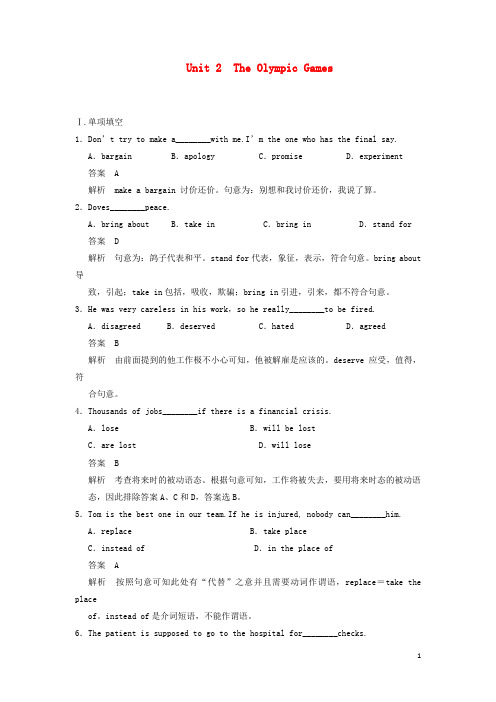
Unit 2 The Olympic GamesⅠ.单项填空1.Don’t try to make a________with me.I’m the one who has the final say.A.bargain B.apology C.promise D.experiment 答案 A解析make a bargain 讨价还价。
句意为:别想和我讨价还价,我说了算。
2.Doves________peace.A.bring about B.take in C.bring in D.stand for 答案 D解析句意为:鸽子代表和平。
stand for代表,象征,表示,符合句意。
bring about 导致,引起;take in包括,吸收,欺骗;bring in引进,引来,都不符合句意。
3.He was very careless in his work,so he really________to be fired.A.disagreed B.deserved C.hated D.agreed 答案 B解析由前面提到的他工作极不小心可知,他被解雇是应该的。
deserve应受,值得,符合句意。
4.Thousands of jobs________if there is a financial crisis.A.lose B.will be lostC.are lost D.will lose答案 B解析考查将来时的被动语态。
根据句意可知,工作将被失去,要用将来时态的被动语态,因此排除答案A、C和D,答案选B。
5.Tom is the best one in our team.If he is injured, nobody can________him.A.replace B.take placeC.instead of D.in the place of答案 A解析按照句意可知此处有“代替”之意并且需要动词作谓语,replace=take the placeof。
高三英语一轮复习必备精品Module2 unit2 The Olympic Games
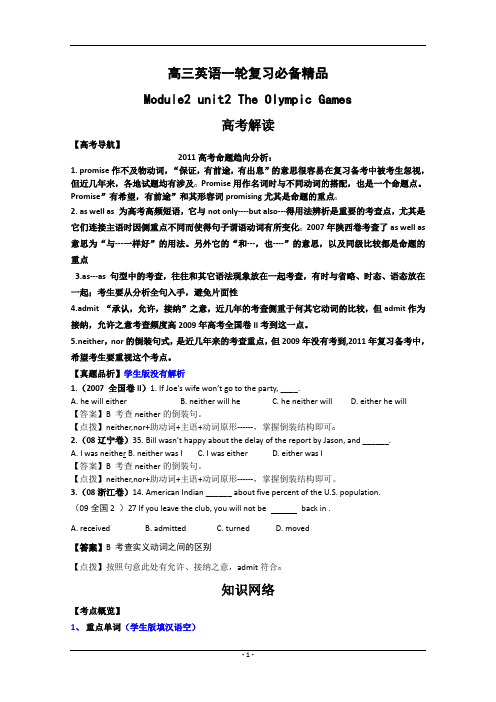
高三英语一轮复习必备精品Module2 unit2 The Olympic Games高考解读【高考导航】2011高考命题趋向分析:1. promise作不及物动词,“保证,有前途,有出息”的意思很容易在复习备考中被考生忽视,但近几年来,各地试题均有涉及Promise用作名词时与不同动词的搭配,也是一个命题点。
Promise”有希望,有前途”和其形容词promising尤其是命题的重点2. as well as 为高考高频短语,它与not only----but also---得用法辨析是重要的考查点,尤其是它们连接主语时因侧重点不同而使得句子谓语动词有所变化2007年陕西卷考查了as well as 意思为“与---一样好”的用法。
另外它的“和---,也----”的意思,以及同级比较都是命题的重点3.as---as 句型中的考查,往往和其它语法现象放在一起考查,有时与省略、时态、语态放在一起;考生要从分析全句入手,避免片面性4.admit “承认,允许,接纳”之意,近几年的考查侧重于何其它动词的比较,但admit作为接纳,允许之意考查频度高2009年高考全国卷II考到这一点。
5.neither,nor的倒装句式,是近几年来的考查重点,但2009年没有考到,2011年复习备考中,希望考生要重视这个考点。
【真题品析】学生版没有解析1.(2007 全国卷II)1. If Joe’s wife won’t go to the party, ____.A. he will eitherB. neither will heC. he neither willD. either he will【答案】B 考查neither的倒装句。
【点拨】neither,nor+助动词+主语+动词原形------,掌握倒装结构即可2.(08辽宁卷)35. Bill wasn’t happy about the delay of the report by Jason, and ______.A. I was neitherB. neither was IC. I was eitherD. either was I【答案】B 考查neither的倒装句。
山东省临朐实验中学高三英语一轮复习 Book two Unit 2 The Olympic Game
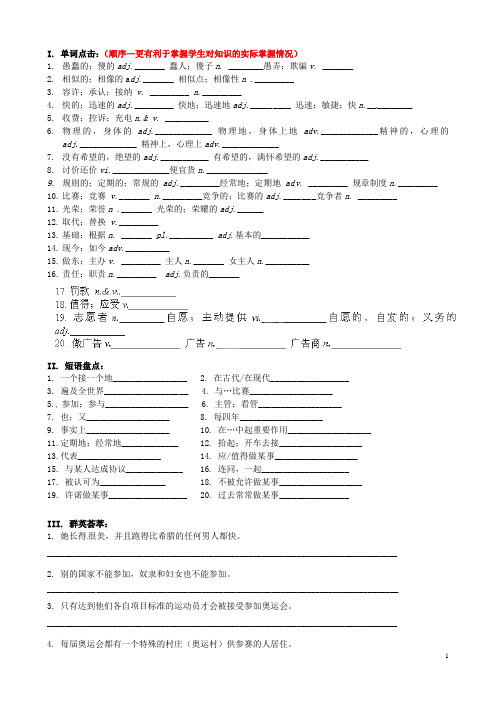
I. 单词点击:(顺序—更有利于掌握学生对知识的实际掌握情况)1.愚蠢的;傻的adj._______ 蠢人;傻子n. ________愚弄;欺骗v. _______2.相似的;相像的a dj._______ 相似点;相像性n ._________3.容许;承认;接纳v. _________ n._________4.快的;迅速的adj._________ 快地;迅速地adj._________ 迅速;敏捷;快n.__________5.收费;控诉;充电n.& v. __________6.物理的,身体的adj._____________ 物理地,身体上地adv._____________精神的,心理的adj._____________ 精神上,心理上adv._____________7.没有希望的,绝望的adj.___________ 有希望的,满怀希望的adj.___________8.讨价还价vi._____________便宜货n.______________9.规则的;定期的;常规的adj._________经常地;定期地adv. _________规章制度n._________10.比赛;竞赛v._______ n._________竞争的;比赛的adj._______竞争者n. _________11.光荣;荣誉n ._______ 光荣的;荣耀的adj.______12.取代;替换v._________13.基础;根据n. _______ pl.__________ adj.基本的___________14.现今;如今adv.__________15.做东;主办v. _________ 主人n._______ 女主人n.__________16.责任;职责n._________ adj.负责的_______II. 短语盘点:1. 一个接一个地_________________2. 在古代/在现代__________________3. 遍及全世界___________________4. 与…比赛___________________5.参加;参与___________________6. 主管;看管___________________7. 也;又___________________ 8. 每四年___________________9. 事实上___________________ 10. 在…中起重要作用___________________11.定期地;经常地_____________ 12. 拾起;开车去接___________________13.代表___________________ 14. 应/值得做某事___________________15. 与某人达成协议_____________ 16. 连同,一起____________________17. 被认可为_______________ 18. 不被允许做某事___________________19. 许诺做某事__________________ 20. 过去常常做某事________________III. 群英荟萃:1. 她长得很美,并且跑得比希腊的任何男人都快。
高考英语一轮复习知识排查突破book2Unit2Theolympicgames新人教
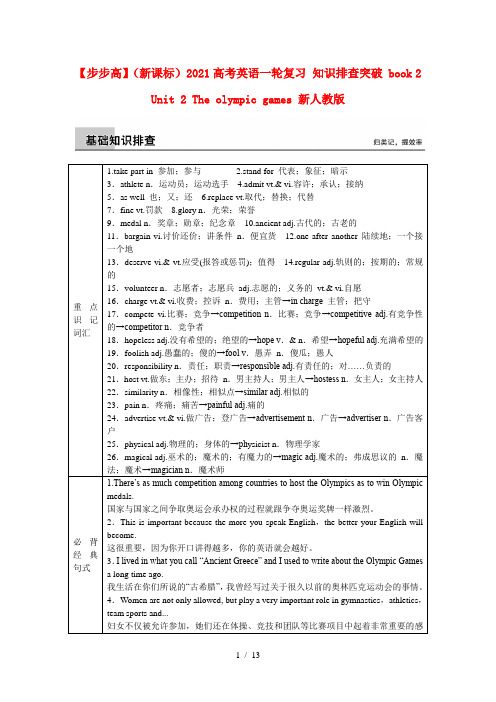
【步步高】(新课标)2021高考英语一轮复习知识排查突破 book 2 Unit 2 The olympic games 新人教版重点识记词汇1.take part in 参加;参与 2.stand for 代表;象征;暗示3.athlete n.运动员;运动选手 4.admit vt.& vi.容许;承认;接纳5.as well 也;又;还 6.replace vt.取代;替换;代替7.fine vt.罚款8.glory n.光荣;荣誉9.medal n.奖章;勋章;纪念章10.ancient adj.古代的;古老的11.bargain vi.讨价还价;讲条件n.便宜货12.one after another 陆续地;一个接一个地13.deserve vi.& vt.应受(报答或惩罚);值得14.regular adj.轨则的;按期的;常规的15.volunteer n.志愿者;志愿兵adj.志愿的;义务的vt.& vi.自愿16.charge vt.& vi.收费;控诉n.费用;主管→in charge 主管;把守17.compete vi.比赛;竞争→competition n.比赛;竞争→competitive adj.有竞争性的→competitor n.竞争者18.hopeless adj.没有希望的;绝望的→hope v.& n.希望→hopeful adj.充满希望的19.foolish adj.愚蠢的;傻的→fool v.愚弄n.傻瓜;愚人20.responsibility n.责任;职责→responsible adj.有责任的;对……负责的21.host vt.做东;主办;招待n.男主持人;男主人→hostess n.女主人;女主持人22.similarity n.相像性;相似点→similar adj.相似的23.pain n.疼痛;痛苦→painful adj.痛的24.advertise vt.& vi.做广告;登广告→advertisement n.广告→advertiser n.广告客户25.physical adj.物理的;身体的→ph ysicist n.物理学家26.magical adj.巫术的;魔术的;有魔力的→magic adj.魔术的;弗成思议的n.魔法;魔术→magician n.魔术师必背经典句式1.There’s as much competition among countries to host the Olympics as to win Olympic medals.国家与国家之间争取奥运会承办权的过程就跟争夺奥运奖牌一样激烈。
- 1、下载文档前请自行甄别文档内容的完整性,平台不提供额外的编辑、内容补充、找答案等附加服务。
- 2、"仅部分预览"的文档,不可在线预览部分如存在完整性等问题,可反馈申请退款(可完整预览的文档不适用该条件!)。
- 3、如文档侵犯您的权益,请联系客服反馈,我们会尽快为您处理(人工客服工作时间:9:00-18:30)。
who are
only men, no both men
allowed: women or slaves and women
sports
running, horse riding (several)
over 250
prize
olive wreath
medals
Post-reading
1.The winter Olympics are usually held two
A.Rio de Janeiro, Brazil B. Sydney, Australia
C. New York, USA
9. What do the five Olympic rings stand for?
Europe
Africa
America
Asia
Oceania
The five rings stand for friendship of five continents.
Who is Li Yan?
She is a volunteer for the 2008 Olympic Games.
Fast Reading
This iWntheravt’isetwheismmoattionolyf athbeoOutly_m__p_ic.s? A. A magic journey by Pausanias.
Pre-reading
AN INTERVIEW
Pausanias
interviewer
Li yan
interviewee
Who is Pausanias?
A Greek writer about 2000 years ago.
What does he want to do ? He wants to find out about the present-day Olympic Games.
C. the U.S.A
3. What was the prize for the winners in ancient Olympic Games? A. Metals B. Medals C. Olive wreath
4. When and where did the modern Olympics start?
ancient and modern Olympics.
3.The athletes compete not for money but for
_h__o_n_o_r_. 4.The mottos are the same. They are:
_S_w__if_te_r_, _h_ig__h_e_r_a_n_d__s_tr. onger 5.Some events are the same, such as running s_w_i_m__m_i_n_g_,__s_a_iling etc.
Summary
Swifter
Higher
Stronger
视频超链接
You know our government has tried its best to compete for hosting the 29th Olympic Games. It has cost a lot of money. Do you think it is worthwhile? Why?
B. The similarities and differences about the ancient and modern Olympics.
C. The ancient Olympic Games in Greece.
Swifter.
Higher
Stronger
1.Both are held every f_o_u_r_y_e_a__rs_.____. 2.__M_e__n_are allowed to take part in both in
7. What is the slogan (口号) of the Olympic Games of 2008?
A. New Beijing, Great Olympics. B. Swifter, Higher, Stronger C. One World, One Dream
8. What is the host city of 2016 Olympics?
years before the summer Olympics. T
2. There are no running races or horse riding
பைடு நூலகம்
events in the Summer Olympics.
F
3. Pausanias doesn’t like the ideas of the
modern Olympics.
F
4. There are more than 250 sports events and each has its own standard in the modern Olympics.
T
5. The interview between Pausanias and Li Yan is a true story. F
Lead in---- Quiz
Quiz about
1. When did the ancient Olympic Games start?
A. 1896
B. 1906
C. 776 BC
2.Where did the ancient Olympics start?
A. Rome B. Greece
Differences
Ancient Olympics
Modern Olympics
seasons for
only in
summer and
the Olympics summer
winter
only the people competitors in Greece
all over the world
A. 1896 Olympia
B. 1896 Athens
C. 1900 Athens
5. What was rewarded to the winners in modern Olympic Games?
A. Metals B. Medals C. Olive wreaths
6. Who was China’s first gold medal winner and for what event? A.Li Ning, gymnastics B.Xu Haifeng, shooting C.Fu Mingxia, diving
